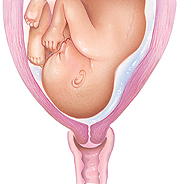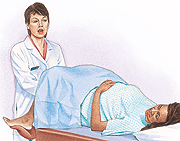Understanding Preterm Labor
Going into labor before your 37 week of pregnancy is called preterm labor. Preterm labor can cause your baby to be born too soon. This can lead to a number of health problems that may affect your baby.

Before labor, the cervix is thick and closed.

In preterm labor, the cervix begins to efface (thin) and dilate (open).
Symptoms of Preterm Labor
If you believe you're having preterm labor, get medical help right away. But contractions alone don't mean you're in preterm labor. What matters more are changes in your cervix (the lower end of the uterus). Symptoms of preterm labor include:
-
Four or more contractions per hour
-
Strong contractions
-
Constant menstrual-like cramping
-
Low-back pain
-
Mucous or bloody vaginal discharge
-
Bleeding or spotting in the second or third trimester

A pelvic exam can help your doctor find out whether your cervix has thinned and opened.
Evaluating Preterm Labor
Your doctor will try to find out whether you're in preterm labor or whether you're just having contractions. He or she may watch you for a few hours. The following tests may be done:
-
Pelvic exam to see if your cervix has effaced (thinned) and dilated (opened)
-
Uterine activity monitoring to detect contractions
-
Fetal monitoring to check the health of your baby
-
Ultrasound to check your baby's size and position
-
Amniocentesis to check how mature your baby's lungs are
Caring for Yourself at Home
If you have contractions preterm but your cervix is still thick and closed, your doctor may ask you to do the following at home:
When to Call Your Doctor
Call your doctor or other healthcare provider if you notice any of these:
If You Need Hospital Care
Preterm labor often requires that you have hospital care and complete bed rest. You may have an IV (intravenous) line to get fluids. And you may be given pills or an injection to help prevent contractions. Finally, you may receive medicine that helps your baby's lungs mature more quickly.
Are You at Risk?
Any pregnant woman can have preterm labor. It may start for no reason. But these risk factors can increase your chances:
-
Past preterm labor or past early birth
-
Smoking and drug or alcohol use during pregnancy
-
Multiple fetuses (twins or more)
-
Problems with the shape of the uterus
-
Bleeding during the pregnancy
The Dangers of Preterm Birth
A baby born too soon may have health problems. This is because the baby didn't have enough time to mature. The baby then is at risk of:
-
Not breastfeeding well
-
Having immature lungs
-
Bleeding in the brain
-
Dying
Reaching Term
Your goal is to get as close to term as you can before giving birth. The closer you get to term, the greater your chances of having a healthy baby. Work with your healthcare provider. Together, you can take steps that may keep you from giving birth too early.

